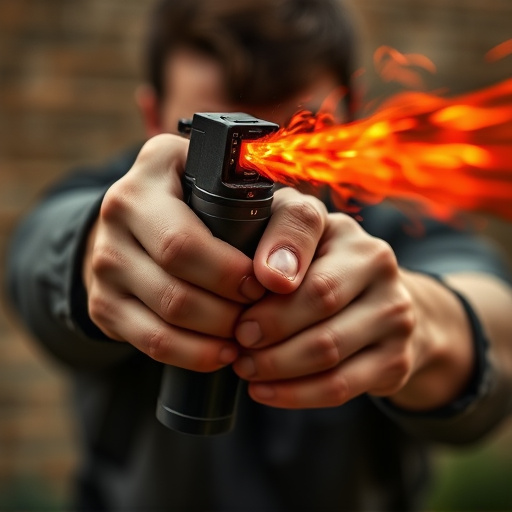TL;DR:
Exposure to pepper spray causes temporary pain, disorientation, and breathing difficulties. To treat this, immediately move to fresh air, remove contaminated clothing, wash faces with water, clean eyes gently for 15 minutes, and use inhalers or damp cloths for breathing issues. If symptoms persist, seek medical attention. Proper storage and handling of pepper spray are crucial to prevent accidental exposure.
“Staying safe in potentially dangerous situations is paramount, and pepper spray self-defense weapons offer a powerful yet accessible defense option. This article guides you through understanding the effects of pepper spray, critical immediate steps after exposure, and essential long-term care precautions. Learn how to treat pepper spray exposure effectively, ensuring your safety and well-being. Discover expert tips on managing symptoms and preventing future incidents with this comprehensive resource, ‘How to Treat Pepper Spray Exposure’.”
- Understanding Pepper Spray and Its Effects
- Immediate Steps After Pepper Spray Exposure
- Long-term Care and Safety Precautions
Understanding Pepper Spray and Its Effects
Pepper spray, a non-lethal self-defense weapon, uses capsaicin, the active ingredient in chili peppers, to cause temporary disorientation and pain in an attacker. When exposed, pepper spray can lead to teary eyes, coughing, difficulty breathing, and decreased visibility. Understanding these effects is crucial for knowing how to respond if you or someone else experiences exposure.
To treat pepper spray exposure, immediately seek fresh air by moving to a safe location away from the source. Remove any contaminated clothing, wash your face with water, and gently clean your eyes with diluted eye rinse or clean water. If breathing is difficult, use an inhaler or take shallow breaths through a damp cloth. It’s important to remember that symptoms can last for several minutes, so staying calm and seeking medical attention if needed is vital.
Immediate Steps After Pepper Spray Exposure
If you’ve been exposed to pepper spray, the first steps are critical for mitigating its effects. Immediately after exposure, move to a safe location away from the source of the spray. This is crucial as it helps prevent further inhalation or contact with skin and eyes. Remove any clothing that has come into direct contact with the spray, taking care not to rub or wipe affected areas, which can spread the irritants.
Next, flush exposed eyes thoroughly with clean water for at least 15 minutes. This will help dilute the pepper spray chemicals. For facial exposure, rinse your face gently using cool water. If possible, seek medical attention, especially if symptoms persist or are severe. How to treat pepper spray exposure also involves monitoring and addressing breathing difficulties, as the spray can irritate airways. Staying calm and focusing on slow, controlled breathing can help manage these symptoms until professional aid arrives.
Long-term Care and Safety Precautions
In the event of accidental exposure or misuse, it’s crucial to know how to treat pepper spray exposure promptly and safely. If you come into contact with pepper spray, regardless of whether it was intended, take immediate steps to minimize its effects. Start by moving to a safe, open area away from the source of the spray. Remove any contaminated clothing, washing it thoroughly with soap and water to prevent residual chemicals from spreading further.
To alleviate discomfort, flush your eyes gently with clean water for at least 15 minutes. Ensure you wear goggles or protect your eyes during this process. If breathing becomes challenging due to inhalation, move to an area with fresh air and seek medical attention if symptoms persist. Remember that proper storage and handling of pepper spray are essential to avoid accidental exposure. Always keep it out of reach of children and store it in a secure, well-labeled container as per the manufacturer’s instructions.
Pepper spray can be a powerful self-defense tool, but it’s crucial to understand its effects and how to safely manage exposure. By understanding what pepper spray is and taking immediate steps after contact, along with implementing long-term care precautions, you can ensure your safety and well-being. Remember, knowing How to Treat Pepper Spray Exposure is vital for anyone considering self-defense options. Stay informed, stay safe.
